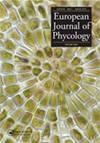Traits influence dinoflagellate C:N:P
IF 1.7
4区 生物学
Q2 MARINE & FRESHWATER BIOLOGY
引用次数: 6
Abstract
ABSTRACT Dinoflagellates are amongst the most abundant and diverse groups of plankton in surface waters and contribute to food web productivity and C:N:P biogeochemistry. Here we analyse the C:N:P of marine, autotrophic, planktonic dinoflagellates compiled from culture data from the scientific literature and test if dinoflagellate C:N:P differs from the Redfield ratio, and whether variability in C:N:P is associated with three traits: cell size, wall structure and toxin production. We find the average C:N:P of dinoflagellates is 90:12:1; higher in C:N, and lower in C:P and N:P than the canonical Redfield ratio. In aggregate the three traits examined here account for between 20–31% while taxonomic order accounts for between 37–38% of the variance in C:N:P. Smaller-sized and thecate taxa are higher in C:N, C:P and N:P than larger-size and athecate taxa. Species known to be able to produce C-rich toxins tend to be higher in C:P and N:P while species known to be able to produce N-rich toxins are lower in C:N, C:P and N:P relative to non-toxic species. These results indicate that any average estimate of dinoflagellate C:N:P will be influenced by the relative number of taxa with these traits.性状对鞭毛藻C:N:P的影响
鞭毛藻是地表水中数量最多、种类最多的浮游生物之一,对食物网生产力和C:N:P生物地球化学有重要贡献。本文从科学文献的培养数据中分析了海洋、自养和浮游鞭毛藻的C:N:P,并测试了鞭毛藻的C:N:P是否与Redfield比值不同,以及C:N:P的变化是否与细胞大小、细胞壁结构和毒素产生这三个性状有关。我们发现鞭毛藻的平均C:N:P为90:12:1;C:N比高,C:P和N:P比低。在C:N:P变异中,三种性状占20-31%,而分类顺序占37-38%。小尺寸和有形类群的C:N、C:P和N:P高于大尺寸和有形类群。已知能够产生富C毒素的物种往往具有较高的C:P和N:P,而已知能够产生富N毒素的物种相对于无毒物种具有较低的C:N、C:P和N:P。这些结果表明,任何对鞭毛藻C:N:P的平均估计都会受到具有这些性状的类群相对数量的影响。
本文章由计算机程序翻译,如有差异,请以英文原文为准。
求助全文
约1分钟内获得全文
求助全文
来源期刊

European Journal of Phycology
生物-海洋与淡水生物学
CiteScore
4.80
自引率
4.20%
发文量
37
审稿时长
>12 weeks
期刊介绍:
The European Journal of Phycology is an important focus for the activities of algal researchers all over the world. The Editors-in-Chief are assisted by an international team of Associate Editors who are experts in the following fields: macroalgal ecology, microalgal ecology, physiology and biochemistry, cell biology, molecular biology, macroalgal and microalgal systematics, applied phycology and biotechnology. The European Journal of Phycology publishes papers on all aspects of algae, including cyanobacteria. Articles may be in the form of primary research papers and reviews of topical subjects.
The journal publishes high quality research and is well cited, with a consistently good Impact Factor.
 求助内容:
求助内容: 应助结果提醒方式:
应助结果提醒方式:


